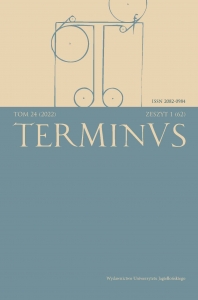Mowa Aderat nuper Eneasza Sylwiusza Piccolominiego z 1445 roku
The Oration Aderat nuper (1445) by Enea Silvio Piccolomini
Author(s): Michał CzerenkiewiczSubject(s): Studies of Literature, Ethics / Practical Philosophy, 15th Century, Theory of Literature
Published by: Wydawnictwo Uniwersytetu Jagiellońskiego
Keywords: 15th century poetry; Enea Silvio Piccolomini; University of Vienna; quodlibetal question; Quodlibet Viennense;
Summary/Abstract: The article consists of two parts: the introduction and a collective translation of an address delivered by Enea Silvio Piccolomini on 25 November 1445 in Vienna, and published subsequently. Currently referred to as Quodlibet Viennense, Aderat nuper oration or Piccolomini’s letter 104, the speech follows the convention of a free dispute (de quolibet). Its content and circumstances of the oration have been dealt with by Alphons Lhotsky, Guido Kisch, Michael Cotta-Schönberg and Juliusz Domański in their texts devoted to Piccolomini. The author refers to these works, focusing especially on the latest edition of Cotta-Schönberg (made public on the Internet) and Domański’s findings, as well as makes references to the 15th century incunabula items. The introduction presents the circumstances of Piccolomini’s stay at the Vienna court of Frederick III in the 1440s. It also discusses texts in which Piccolomini shared his views on poetry, and goes on to characterise the structure of the de quolibet dispute in comparison to the speech under scrutiny, which reveals several differences between a typical quodlibet and Piccolomini’s text. Additionally, the question is raised about the presence and role of a third person involved in the process of writing down a spoken text, which is today known from print mainly. The topics touched upon by Piccolomini’s address are also discussed. The orator replies to three questions that he has been asked, the most important of which is the second one, as evidenced by the space devoted to it. The three questions oscillate around i) ethical issues, i.e. alleged equipollence of knowledge on ethics (scientia moralis) with prudence (prudentia), ii) insufficient, but according to Piccolomini necessary presence of poets in social life and defence of poetry against accusations of immorality, and iii) high prices of such writing materials as paper and parchment. The translated text was created collectively during a Neo-Latin studies seminar carried out by Professor Juliusz Domański in the Institute of Classical Studies at the University of Warsaw in the academic cycles 2008/2009 and 2009/2010. Professor Domański has made a handwritten transcription of one of the manuscript versions of this oration, which was then read by the courses’ attendees.
Journal: TERMINUS
- Issue Year: 24/2022
- Issue No: 1 (62)
- Page Range: 93-122
- Page Count: 30
- Language: Polish

